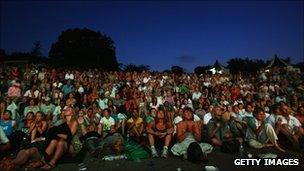Health and safety 'excuse' for unpopular decisions
- Published
- comments

This summer's decision to turn off the big screen at Wimbledon's "Henman Hill" caused a row
Councils and companies are using health and safety rules as an excuse to make "unpopular decisions" banning low-risk activities, a watchdog says.
The Health and Safety Executive has published a list of what it says were the 10 most "bizarre bans" on health and safety grounds over the past year.
They include bans on kite flying on a beach, sack races for children and pins used to secure commemorative poppies.
But experts have warned of many cases where risks are underappreciated.
The HSE said complying with health and safety regulations was often used as a "convenient excuse" for organisations to justify unnecessary decisions.
Among examples on its list were a school's decision to ban football games unless the ball was made of sponge, and a ban on street parties to mark the royal wedding in April.
'Undermining confidence'
The most high-profile case it cites was the decision by the Wimbledon tennis authorities to stop showing television coverage of a key game on a big screen on "Henman Hill" - a popular vantage point where crowds have congregated for years to watch matches.
The decision, taken because of concerns about safety conditions after hours of heavy rain and poor visibility, led to a row between the watchdog and organisers The All England Lawn Tennis Club.
The HSE also questioned the rules for dodgem rides after reports in April that Butlins had banned people bumping into each other at its Skegness holiday camp on health and safety grounds.
At the time, ministers cited the case as evidence that regulations were being wrongly applied, saying it had no basis under current laws and they were "disappointed" by the decision.
The HSE said such cases "started to undermine people's confidence in health and safety law and the work it does to protect people at work from serious risk".
While there were a clear set of laws regulating health and safety in the workplace, it said "what other people choose to see as health and safety is quite vague and ill-defined".
'Safe environment'
The All England Lawn Tennis Club said it had acted on the advice of its own safety officials, based on their assessment of the risks caused by conditions and crowd numbers on one particular evening.
"The term health and safety gets bandied about but it (the decision) was nothing to do with health," a spokesman said. "It was entirely to do with safety and the personal risks from a specific set of circumstances at a specific time.
"It was not a blanket decision that every time we get rain we are going to shut it down."
And Butlins said there had been "no change" to the way it ran its dodgem rides.
"Like most operators of dodgems we decided long ago that a 'no deliberate bumping' policy means that everyone - even our youngest riders - can enjoy a fun experience in a safe environment," a company spokeswoman said.
"This is not a response to legislation but ensures that all our families enjoy their time at our resort."
An independent review of current health and safety legislation in the UK is due to report in October, with ministers keen to consolidate or simplify existing regulations.
'Harmless things'
In response to the HSE report, employment minister Chris Grayling said members of the public should "challenge health and safety myths" and overzealous practices.
"We have seen an epidemic of excuses wrongly citing health and safety as a reason to prevent people from doing pretty harmless things with only very minor risks attached," he said.
"This has to stop. The law does not require this to happen - people must be encouraged to use their common sense."
One health and safety expert said the law required people to approach risks in a balanced and proportionate manner.
"Overzealousness about trivial risks gives health and safety a bad name but there are actually many more cases where people are under-hitting," said Roger Bibbings, occupational safety adviser for the Royal Society for the Prevention of Accidents.
Good health and safety practice was all about "exercising judgement", he added.
"People in authority such as councillors and managers need to be much more 'risk literate' or 'risk intelligent'. And third partiers such as clients, funders or insurers need to avoid requiring people to do things in the name of 'elf 'n' safety' which are not actually required by the law."
- Published15 October 2010
- Published2 October 2010